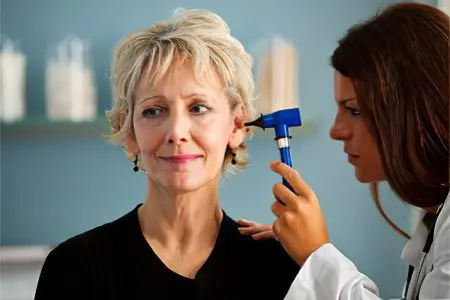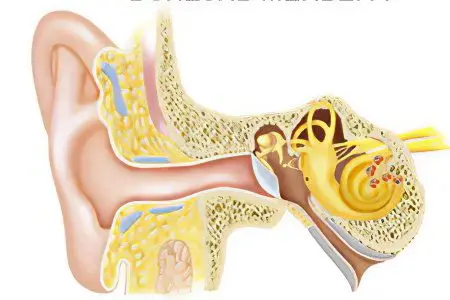Contents

Every person who is faced with this problem thinks about how to get rid of noise in the ears and in the head. Don’t try to find a solution on your own. The cause of extraneous noise must be determined by the doctor, and only he can prescribe the appropriate treatment.
Diagnosis of tinnitus is the responsibility of such a specialist as an otolaryngologist. In addition, consultation with a cardiologist, endocrinologist, neurologist or psychotherapist may be required. Only after clarifying the cause of tinnitus, it will be possible to prescribe an effective and safe treatment.
So, the first step to combat tinnitus should be a trip to the ENT doctor. The doctor will examine the hearing organs to detect injuries and inflammation in them. The next step is a brain scan. Often it is the defeat of its structures that leads to noise in the ears and head.
In addition, the patient may be assigned the following set of examinations:
Donation of blood and urine for a general analysis. These studies allow us to judge the general state of human health. A high level of red blood cells and hemoglobin in the blood will indicate a possible thrombosis. Thrombi formed in the vessels provoke circulatory disorders, and this negatively affects the state of the body as a whole. Anemia with developing hypoxia entails oxygen starvation of the brain and the appearance of tinnitus. If it is found that the patient has a high ESR, then a bacterial infection or the growth of a malignant tumor can be suspected. During the confrontation with the pathogenic flora, the level of leukocytes in the body increases, which can also be seen from the results of a general blood test. Diabetes mellitus is a disease that destroys blood vessels, affecting, among other things, those blood vessels in the brain. If you suspect atherosclerosis, liver and kidney disease, or anemia, you need to pass an extended blood test (BAC).
Electroencephalography of the brain allows to exclude epilepsy. ECHO-EG can provide information about the presence of pathological foci of inflammation in the brain. Computed and magnetic resonance imaging allows you to clarify information about the state of this organ.
Sometimes noise in the head occurs due to diseases of the spinal column. In order to assess his condition, the patient is sent for an MRI of the cervical spine.
Damage to the vessels supplying the brain and spinal column can be diagnosed using angiography. This technique allows to detect atherosclerosis.
An audiogram is a study aimed at establishing hearing acuity. For the same purpose, conduct a hearing test.
When a comprehensive examination is completed, the doctor will make a conclusion about the state of human health. If no problems with the hearing organs and the brain are found, then it makes sense to contact a cardiologist and examine the heart. In addition, noise in the head and in the ears may indicate mental disorders, so additional consultation with a psychiatrist and psychotherapist may be required.
Another area of research is the human respiratory system. It can also be a source of extraneous noise.
There is such a thing as illusory noise in medicine. In this case, extraneous sounds will be present exclusively in the head of the patient. This disorder has psychological roots.
Noises of various kinds can indicate diseases of the ear, inflammation of its internal structures, eardrum, Eustachian tube, auditory nerve. At the same time, a person can hear a buzz, rattle, whistle, hum, squeak, etc.
After the cause of the noises arising in the ear is established, the doctor will prescribe treatment with the use of medicines. In addition to medical correction, it may be necessary to wash the ear canals to remove the sulfuric plug, magnetotherapy or acupuncture, as well as other physiological procedures.
Treatment depending on the disease
If tinnitus from high blood pressure

When noise in the head occurs against the background of high pressure, an integrated approach to treatment is necessary.
To do this, use:
Drugs from the group of beta-blockers. Their action is aimed at vasoconstriction, treatment of heart failure.
Diuretics. Their reception allows to reduce tissue edema, narrow blood vessels, and normalize the blood supply to the brain. As a result, the noise in the head recedes.
Drugs that normalize the work of the heart. They normalize metabolic processes in the vascular walls, enhance the regeneration of heart muscle tissue.
At the same time, there are no special medicines that would be prescribed to hypertensive patients specifically for the treatment of noise in the head. It is important to cope with high blood pressure, and tinnitus will go away on its own.
If the problem is in the circulation
Circulatory problems will occur after the injury, against the background of hypertension and atherosclerosis. All these conditions are accompanied by tinnitus.
The following means may be used:
Drugs from the group of calcium channel blockers. Their reception allows you to strengthen the vascular wall, increase its elasticity and flexibility. At the same time, headaches go away, dizziness and hum in the ears cease to bother.
Nootropic drugs. Their intake helps to increase microcirculation in the brain, eliminate the effects of hypoxia, which is an excellent prevention of the formation of blood clots.
Vasotropes. Taking these drugs does not allow the vascular wall to thicken. It also improves blood circulation throughout the body.
Sedative drugs. They are recommended to be taken in the case when tinnitus develops against the background of stress.
It is impossible to refuse treatment immediately after tinnitus and other manifestations of the disease are eliminated. The duration of the therapeutic course should be determined by the doctor.
If the problem is in diseases of the inner ear

If a person has diseases of the organ of hearing, which causes tinnitus, then it is necessary to visit an otolaryngologist and undergo a comprehensive diagnosis.
It is possible that otitis media, otosclerosis, Meniere’s disease or some other pathology will be diagnosed.
Complex therapy involves:
Antipyretic It is recommended to take in the case when the patient has a high body temperature. In addition to tinnitus, there may be noise in the head, which proceeds as a pulsation.
Antibacterial drugs prescribed for bacterial infection, chronic inflammation, purulent otitis media.
Antihistamines. Their reception allows to reduce swelling of the middle ear.
In Meniere’s disease, antipsychotics are indicated. This allows you to eliminate acute manifestations of pathology and normalize the patient’s condition.
Antispasmodics are used to relax facial muscles and to dilate blood vessels.
If a patient is diagnosed with otosclerosis, then this worsens the prognosis for recovery.
In a complex treatment regimen, vitamin and mineral complexes with B vitamins, zinc, vitamin A and E are used.
Local treatment of tinnitus
Treatment of tinnitus involves local therapy:
The use of nasal drops allows you to remove swelling from the Eustachian tube, reduce tension in the eardrum and eliminate extraneous sounds in the ears.
Ear drops can reduce inflammation in the ear canal.
Any drugs for the treatment of tinnitus should be prescribed by a doctor. Self-therapy is not allowed.
[Video] How to treat tinnitus? Explanations of a neurologist









